Pot Vegetable Gardening For Beginners

Growing Vegetables In Containers For Beginners
Want to grow your own vegetables, but, have no room. Container vegetable gardening is for you! Oh, you're a beginner? No worries! We have you covered right here we will cover everything needed for Container Vegetable Gardening for beginners!
You don't need a green thumb to be able to grow a bounty of fresh vegetables, even in the comfort of your balcony, backyard, or indoors. Vegetable container gardening can bring you bounty and joy. Seeing a tomato glistening in the sun and harvesting it on the spot and enjoying the sweet taste of success, is unbeatable!
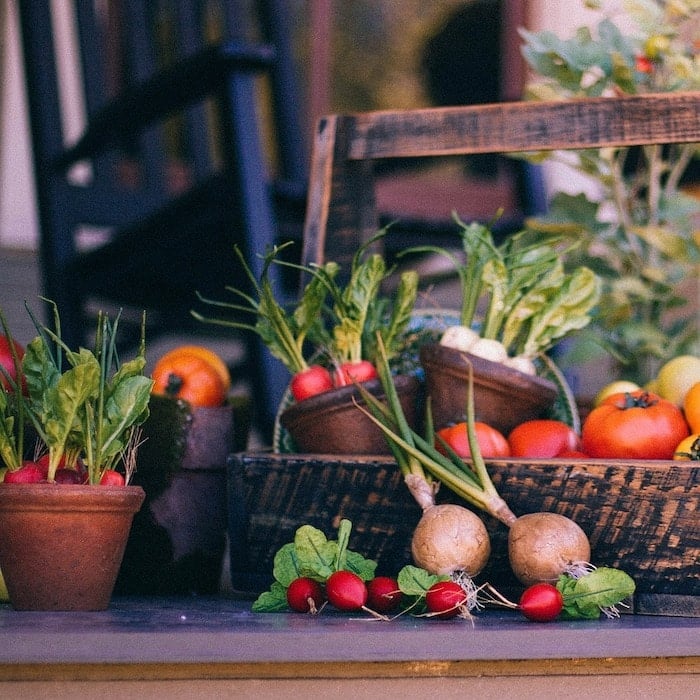
Plus, growing vegetables in a container can save you serious money. You also know exactly what goes into your family's meals because you know what went into the container, soil, and fertilizer by growing your own ingredients at home.
However, container vegetable gardening can be frustrating — and expensive — especially for beginners! Don't overwhelm yourself by planning too much to start off! Get your pen and paper ready as we learn more on how to start your very own container vegetable garden!
You Might Also Like This: Container Vegetable Gardening Must Haves To Get Started NOW!
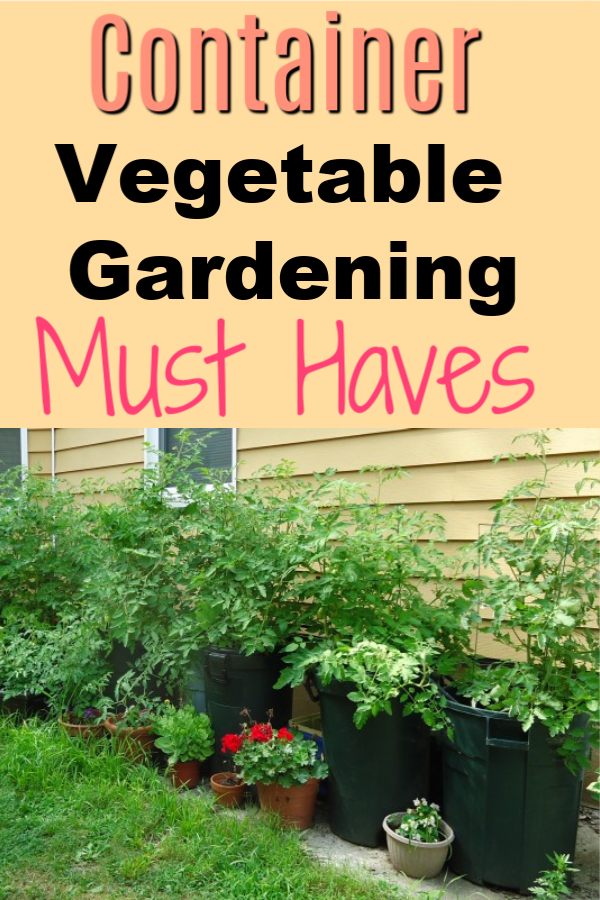
Choose What You Want To Grow
Whether you're a beginner or you want to start a vegetable garden with the least effort, here are easiest plants to start with and will guarantee your success with your container garden.
Tomatoes
The most popular garden vegetable, no matter what size garden you choose to have, is tomatoes. If you love fresh tomatoes all year round, you can easily grow them in containers indoors or in a greenhouse. Just add a cage to the outside of the container for extra support as your plant gets taller. Tomatoes require full sun, so, keep that in mind when you choose where your plant will live.
Parsley
Parsley grows well in containers, even in small ones. This herbs requires only partial sunlight, so, it's perfect for apartments or tight places. I found out I have a skin allergy to this and Cilantro. If you're prone to a skin allergy always handle Parsley and Cilantro with gloves and long sleeves.

Basil
Basil is a great addition to any soups and recipes, plus, it's easy to grow, too. With Basil you want to water the soil directly and give it direct sunlight every day and your plant will easily grow, even indoors.
Cucumber
Cucumbers are very easy to grow in containers. You can also keep them growing during the winter indoors. You can choose the vining variety or there are many bush varieties to choose from, as well
Lettuce
One of the easiest plants to grow in containers is lettuce. You can just sit the container out on your balcony for sunlight and it can grow on its own. It grow quickly, and to harvest just cut off what you need and it will continue growing more for your next salad!
Potato
Believe it or not, potatoes can easily grow in containers. In fact, you can keep growing potatoes all year long. Potatoes grow very well in five-gallon buckets, which can make it easier for you to move them in and out of sunlight. Just be sure to drill a few holes in the bottom of the bucket so it has good drainage.

Carrot
Growing carrots in containers are the same as growing them in the garden. Like potatoes, you need to make sure that the containers have drainage to avoid overwatering. They also need a deep container like a 5-gallon bucket.
Squash
Not only do they taste good, but, squash is also an easy vegetable to grow. Since most squash take up a good bit of space and need a large container, you'll need to allow these plants a bit more room. If you plan to grow them outside you might want to read up on my nemesis and the reason I am growing my Squash and Zucchini indoors.
Squash Vine Borer: How To Prevent, Protect, And Get Rid Of Them!

Radish
Radishes grow quickly and there are a lot of varieties available. They need full sun. They grow super fast and when you harvest one you can pop another seed in and start a new one.
Spinach
Spinach is good for you and your family — it grows very well in containers, too. You can grow spinach indoors, even during winter months. Spinach is another one you can harvest, make a salad, and go back for your next salad and there will be more.
Choose The Right Container
When considering Container Vegetable Gardening For Beginners, I would say this one is one of the biggest mistakes people make.
The size of your container depends not only on the space available, but, on what kind of vegetables you want to grow in it. For vegetable gardening, choose a container that is made of opaque materials like plastic, concrete, or terra cotta.
But, what's the difference between these different containers?
There is a huge difference between the containers commonly used for plant pots and planters. Each of them has its own advantages and disadvantages.

Plastic
Plastic containers and pots are inexpensive. There is also a wide variety of options available for you to choose from.
Lighter colored plastic containers can heat and cool quickly while darker colored ones can retain heat if left in full sun, which may damage the plants.
Plastic containers may not be the best containers for vegetables as they are prone to tipping over, especially during adverse weather.
HOMENOTE 6 inch Plastic Pots
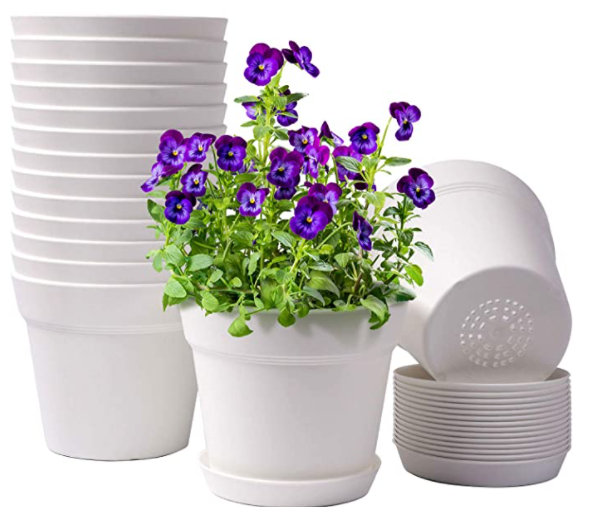
McConkey 5.5" Square Plastic Pots

Terracotta
Another classic material used for plant pots and containers is terracotta. These pots have been widely used for years. Since there are a lot of designs available, they make perfect decorations, too.
Terracotta is porous. Since it absorbs moisture quickly from the soil, it might mean you'll have to make sure your plants don't dry out when using these types of containers. During the cold weather, these pots care also prone to crumbling and cracking.
4 Inch Terra Cotta Pots with Saucer

Peach & Pebble 10-Inch Modern Terracotta

Ceramic
Ceramic containers can be a decorative option, and effective for indoor use.
Unlike terracotta, ceramics are less porous. This can lead to potential water logging, so, it's important to make sure that the ceramic containers you are using have drainage holes in the base.
If you purchase large, decorative, ceramic planters, you can actually fill the bottom and sides with soil or fillers, and plant a not so cute pot INSIDE the decorative, ceramic container.
Greenaholics Succulent Plant Ceramic Pots

White Ceramic Flower Pot Garden Planters

Concrete
If you want the pots and containers to last for decades, use high-quality concrete planters and pots. They are often called a luxury choice and they look better with age.
Concrete is a strong insulator, protecting the plant's roots even against the harshest temperature. However, they can be quite heavy so, they're not easily movable.
Modern 4-Inch Gray Unglazed Cement Succulent Planter Pot

TIVIT Modern Concrete Planter

Fiber-Clay
Fiber-clay pots are an environmentally-friendly choice. They are made from waste pulp fiber combined with clay.
These pots and containers are lighter than stone. They also provide greater resistance than the classic terracotta pot. However, they can be quite expensive and there are not so many to choose from.
GardenBasix Self Watering Planter Pot

Exaco Fiber Clay Flower Garden Planter
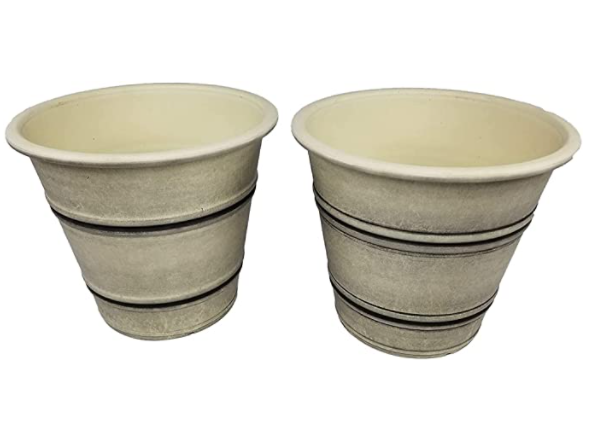
What Size To Choose
This is another big mistake I think of when I think about
Container Vegetable Gardening For Beginners.
Choosing the right size pots and containers to house your vegetables is very important. Although your crops may continue to grow, no matter what size your container is, you need to make sure that the containers will continue to comfortably accommodate them, so that they flourish and not just exist.
If you buy a pot that is too large, it might cause the soil to dry slowly. It can also make the plants increasingly susceptible to root rot. A pot that is too large is also prone to tipping over during bad weather.
Placing a plant in a container that is too small can lead to stunted growth. The plants may also become root bound. Containers and pots that are too small can cause the soil to dry very quickly. This means that you need to water your plants more frequently than usual.
A useful tip when choosing the right size pot is to look for something with a diameter measuring 1.5 times larger than the diameter of your plant's roots. This will ensure that there is plenty of room for the plant to grow.
If your plant has outgrown its current container, look for one that is 2 to 4 inches larger in diameter, if it is a larger plant, or 1 to 2 inches larger if it's a slower growing plant.

Choosing The Right Potting Soil, Mix, And Compost
The potting soil you choose for your container garden is also important. The soil needs to be light and fluffy. It should not be too dense or tightly packed as the plant's roots need to have access to oxygen and be able to retain moisture.
For beginners, choosing an organic potting mix is a better option.
Since you are planting vegetables in containers, it is not recommended to put gravel, bottles or cans in the bottom of your containers. You should fill the entire container with potting mix.
When you grow vegetables in containers, the plants need plenty of soil to develop a root structure to support and feed them, especially when they are heavy with fruits. It's important to choose an appropriate soil and container.
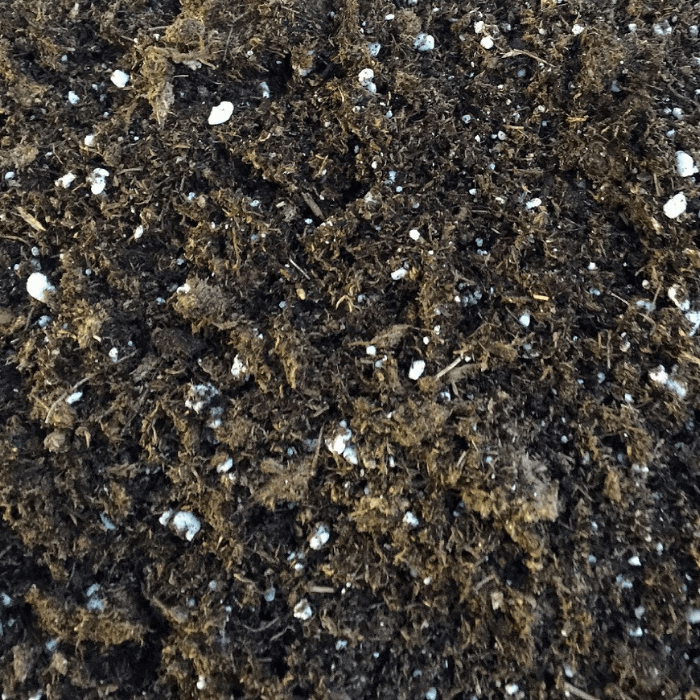
You'll also want to make sure to add some compost to your soil to help add the proper nutrients from the very beginning. You can purchase compost, use your own backyard compost, or start vermicomposting:
DIY Vermicomposting With A Worm Bin!

More Information For Container Vegetable Gardening For Beginners:
– Know your USDA Hardiness Zone – you need to know what zone you're in so you'll know when to plant what to be successful.
– Choose whether to buy seedlings from a nursery to plant, or grow your seedlings from seed yourself.
– Choose your location – Indoors? Outdoors? In a greenhouse? If indoors, choose the proper grow lights, if you don't have enough sunny locations.
You Might Also Like: How Much Potting Soil Do I Need For My Container Gardening?

You don't need to be a pro when it comes to growing vegetables. As long as you know the basics, you can grow vegetables in containers.
Do you have a favorite vegetable you'd like to grow in a container?
You can also find gardening products I use in my videos here <---
I now have an Amazon Influencer's storefront. I put the products I use, in my posts and Youtube Gardening videos, there. Shopping there is free and the site gets a percentage of sales. Thanks!
You can go to my storefront using this secure link <----
If you need seeds, this is the company I use <--- and if you use code: farmer1 at checkout, you'll get 10% off your order!


Pot Vegetable Gardening For Beginners
Source: https://dianfarmer.com/container-vegetable-gardening-for-beginners-indoors-or-outdoors/
Posted by: hallthosed.blogspot.com

0 Response to "Pot Vegetable Gardening For Beginners"
Post a Comment